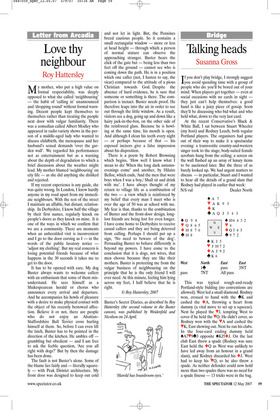Letter from Arcadia
Love thy neighbour
Roy Hattersley
My mother, who put a high value on formal respectability, was deeply opposed to what she called ‘neighbouring’ — the habit of ‘calling in’ unannounced and ‘dropping round’ without formal warning. Decent people kept themselves to themselves rather than treating the people next door with vulgar familiarity. There was a comedian called Albert Modley who appeared in radio variety shows in the person of a middle-aged lady who wanted to discuss childbirth, the menopause and her husband’s sexual demands ‘over the garden wall’. We regarded his performances not as entertainment but as a warning about the depth of degradation to which a brief discussion about the weather might lead. My mother blamed ‘neighbouring’ on city life — as she did anything she disliked and rejected.
If my recent experience is any guide, she was quite wrong. In London, I know hardly anyone in my road apart from my immediate neighbours. With the rest of the street I maintain an affable, but distant, relationship. In Derbyshire, I know half the village by their first names, regularly knock on people’s doors as they knock on mine. It is one of the ways in which we confirm that we are a community. There are moments when an unheralded visit is inconvenient and I go to the door cursing as I — in the words of the public lavatory notice — ‘adjust my clothing’. But my real concern is losing potential friends because of what happens in the 30 seconds it takes me to get to the door.
It has to be opened with care. My dog Buster always wants to welcome callers with an enthusiasm that some of them misunderstand. He sees himself as a Shakespearean herald or chorus who announces every arrival and departure. And he accompanies his howls of pleasure with a desire to make physical contact with the object of his recently bestowed affection. Believe it or not, there are people who do not enjoy an Alsatian– Staffordshire Bull Terrier cross hurling himself at them. So, before I can even lift the latch, Buster has to be pointed in the direction of the kitchen. He ambles off grumbling but obedient — and I am free to ask the feeble question, ‘Are you all right with dogs?’ But by then the damage has been done.
The fault is not Buster’s alone. Some of the blame lies fairly and — literally squarely — with Peak District architecture. My front door was designed to keep out cold and not let in light. But, the Pennines breed cautious people. So it contains a small rectangular window — more or less at head height — through which a person of normal stature can observe the approaching stranger. Buster hears the click of the gate but — being less than two feet off the ground — cannot see who is coming down the path. He is in a position which one caller (not, I hasten to say, the vicar) compared to the attitude of a pious Christian towards God. Despite the absence of hard evidence, he is sure that someone or something is there. The comparison is inexact. Buster needs proof. He therefore leaps into the air in order to see out through the little window. As a result, visitors see a dog, going up and down like a hairy jack-in-the-box, on the other side of the reinforced glass. Because he is howling at the same time, his mouth is open. And although I clean his teeth every night — or perhaps because of that — his exposed incisors give a false impression about his disposition.
There is a poem by Robert Browning which begins, ‘How well I know what I mean to do/ When the long dark autumnevenings come’ and another, by Hilaire Belloc, which ends, ‘And the men that were boys when I was a boy,/ Shall sit and drink with me’. I have always thought of my return to village life as a combination of the two — a view which is reinforced by my belief that every man I meet who is over the age of 50 was at school with me. My fear is that, thanks to the combination of Buster and the front-door design, longlost friends are being lost for even longer.
I have come home to Derbyshire to receive casual callers and they are being deterred from calling. Perhaps I should put up a sign, ‘No need to beware of the dog’. Persuading Buster to behave differently is beyond my powers. I have come to the conclusion that it is dogs, not wives, that men choose because they are like their mothers. Buster is protecting me from the vulgar business of neighbouring on the principle that he is the only friend I will ever need. At this minute, feeling him lying across my feet, I half believe that he is right.
© Roy Hattersley, 2007










































































 Previous page
Previous page